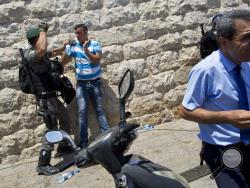JERUSALEM (AP) — Israel banned Muslim men under the age of 50 from a contested Jerusalem shrine Friday and deployed about 3,000 police nearby, ahead of expected Muslim protests over the installation of metal detectors at the holy site.
The age restrictions and police deployment came hours after Israel's security Cabinet decided not to overrule an earlier police decision to install metal detectors at the gates to the walled compound.
The volatile Jerusalem shrine, revered by Muslims and Jews, sits at the center of rival Israeli and Palestinian national narratives and has triggered major confrontations in the past.
Police installed the metal detectors earlier this week, after Palestinian gunmen launched an attack from the shrine and killed two Israeli policemen. Muslim leaders have alleged that the metal detectors are part of a purported Israeli attempt to expand control over the site.
Israel has denied such allegations, arguing that metal detectors are routine security devices.
Muslim leaders have called on worshippers to pray in the streets near the shrine rather than walk through metal detectors. Over the course of the week, growing numbers of Palestinian worshippers have participated in such street prayers, particularly in the evenings. Following such prayers, smaller numbers of Palestinian protesters have clashed with police.
On Thursday evening, police fired rubber bullets, tear gas and stun grenades to disperse protesters who, according to police, threw rocks and bottles. Paramedics from the Red Crescent said 37 people were injured by rubber bullets, three of them seriously.
Friday is the highlight of the Muslim religious week, and tens of thousands of worshippers typically perform prayers at the shrine, known to Muslims as the Noble Sanctuary and to Jews as the Temple Mount.
Muslim leaders have urged the faithful to forego prayers in smaller Jerusalem neighborhood mosques Friday and converge on the shrine, in an attempt to increase the crowd size.
Police announced Friday that Muslim men under the age of 50 would be banned from the shrine and that it was sending reinforcements to Jerusalem.
"Police and border police units mobilized in all areas and neighborhoods," said spokesman Micky Rosenfeld, adding that about 3,000 members of the security forces had been deployed.
A Palestinian advocacy group said Israeli police detained 10 prominent Palestinian activists in Jerusalem, including the leader of Palestinian President Mahmoud Abbas' Fatah movement in the city.
Israeli police had no immediate comment.
Meanwhile, Prime Minister Benjamin Netanyahu's office said the security Cabinet decided to defer to police on security arrangements at the shrine.
"The Cabinet authorized the police to make all decisions in order to ensure free access to holy sites while ensuring security and public order," the statement said. It added that Israel is committed to preserving "the status quo at the Temple Mount and free access to holy sites."
The decision to defer to police came amid reports of disagreement among Israel's security services about the need for the metal detectors. The military and the Shin Bet security services, which deal directly with Palestinians and potential unrest, were reportedly opposed to the devices.
Israel had come under growing pressure this week, including from security ally Jordan, to remove the metal detectors. Jordan is the custodian of the Muslim-administered walled compound, which houses the Al Aqsa and Dome of the Rock mosques.
The rule of Jordan's Hashemite dynasty, said to trace its ancestry back to the Prophet Muhammad, rests to a large degree on its role as guardian of the site.
___
By IAN DEITCH and MOHAMMED DARAGHMEH, Associated Press
___
Associated Press writer Karin Laub in the West Bank contributed reporting.

